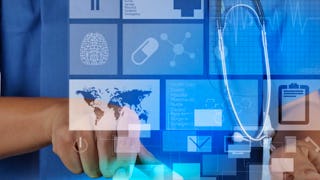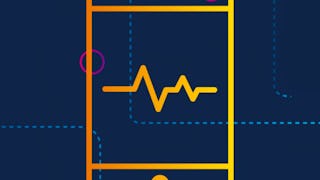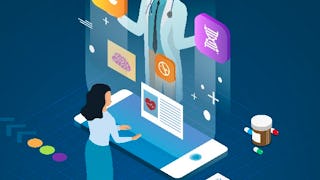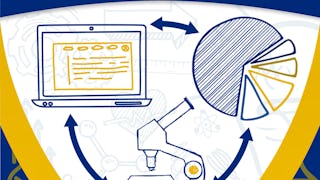This course introduces the field of digital health and the key concepts and definitions in this emerging field. The key topics include Learning Health Systems and Electronic Health Records and various types of digital health technologies to include mobile applications, wearable technologies, health information systems, telehealth, telemedicine, machine learning, artificial intelligence and big data. These technologies are assessed in terms of the key opportunities and challenges to their use and the evidence of their effectiveness in the field of digital health in relation to public health and healthcare globally. The use and application of digital health for COVID-19 forms a case study demonstrating the use of different types of digital health technologies to address key aspects of the response to the virus globally.

Enjoy unlimited growth with a year of Coursera Plus for $199 (regularly $399). Save now.

Introduction to Digital health
This course is part of Digital Health Specialization

Instructor: Ana Luisa Neves
22,663 already enrolled
Included with
(254 reviews)
Skills you'll gain
Details to know

Add to your LinkedIn profile
10 assignments
See how employees at top companies are mastering in-demand skills

Build your subject-matter expertise
- Learn new concepts from industry experts
- Gain a foundational understanding of a subject or tool
- Develop job-relevant skills with hands-on projects
- Earn a shareable career certificate

There are 4 modules in this course
This module will introduce the key concepts and definitions in digital health. You will soon learn that it is a rapidly changing and emerging field. We will also ask for your thoughts early in this week about your own understanding of digital health. You will then be introduced to the growth in digital health technologies, the global distribution of these technologies and the inequalities that exist in terms of access to, and usage of, different forms of digital health technologies to include smartphones, social media and access to the internet. Given this introduction, you will then be introduced to key examples of how digital health projects have been implemented badly, with an example from the UK through the National Programme for IT (NPfIT) and examples of where it has been extremely successful, for example, Estonia.
What's included
4 videos16 readings2 assignments4 discussion prompts3 plugins
In this module, you will firstly be introduced to Electronic Health Records and will learn about what they are, how they have been used and the opportunities and challenges to their use. The focus will then turn to Learning Healthcare Systems, identifying the key components of a good Learning Health System, and analyse some examples of a Learning Health System through strong and weak examples. You will then hear from an expert working at the interface of statistics, data science, and digital health through his work on improving health care safety and quality. Interoperability, a key concept describing how data can be shared across health systems is examined. There will be a variety of learning activities including readings and interactive activities to complement your learning in this module.
What's included
2 videos8 readings5 assignments2 discussion prompts
In this module, you will start to be introduced to a range of digital health technologies and their use and application in public health and healthcare globally. The focus of this week will be on mobile applications, wearable technologies and health information systems. You will learn about what they are, examples of how they have been used and advantages and disadvantages to their use. You will also be provided with a real-world case study on the use of a mobile application for Ebola contact tracing and monitoring in Sierra Leone in 2015 during the Ebola epidemic and will be introduced to the opportunities and challenges of applying digital health technologies for epidemic preparedness and response. There will be a variety of learning activities to complement what you have learnt including readings and interactive activities.
What's included
5 videos9 readings2 assignments1 discussion prompt
In this module, you will be introduced to other digital health technologies such as telehealth and telemedicine, social media, machine learning, artificial intelligence, gamification and behavioural sciences and big data. You will explore these areas through videos, supported readings, reflective questions and interactive activities that assess the role, uses, advantages and disadvantages of these technologies in public health and healthcare globally. This builds on the digital health technologies that you learn about in the previous module.
What's included
5 videos7 readings1 assignment1 discussion prompt3 plugins
Earn a career certificate
Add this credential to your LinkedIn profile, resume, or CV. Share it on social media and in your performance review.
Instructor

Offered by
Explore more from Public Health
 Status: Free Trial
Status: Free TrialEmpower School of Health
 Status: Free Trial
Status: Free TrialImperial College London
 Status: Free Trial
Status: Free TrialEmpower School of Health

Johns Hopkins University
Why people choose Coursera for their career




Learner reviews
254 reviews
- 5 stars
70.07%
- 4 stars
19.29%
- 3 stars
6.29%
- 2 stars
1.96%
- 1 star
2.36%
Showing 3 of 254
Reviewed on Jul 22, 2025
The course refers to too many old sources, like 2011, 2015. Today is 2025. Nevertheless, the information is still interesting and useful.
Reviewed on Feb 8, 2022
Nice introductory course on digital health interventions.
Reviewed on Jun 29, 2024
Nice course who want to learn about Digital Health
Frequently asked questions
fffffffffffffffffffffffffffffffffffffffffffffffffffffffffffffffffffffffffffffffffffffffff
To access the course materials, assignments and to earn a Certificate, you will need to purchase the Certificate experience when you enroll in a course. You can try a Free Trial instead, or apply for Financial Aid. The course may offer 'Full Course, No Certificate' instead. This option lets you see all course materials, submit required assessments, and get a final grade. This also means that you will not be able to purchase a Certificate experience.
When you enroll in the course, you get access to all of the courses in the Specialization, and you earn a certificate when you complete the work. Your electronic Certificate will be added to your Accomplishments page - from there, you can print your Certificate or add it to your LinkedIn profile.
More questions
Financial aid available,





